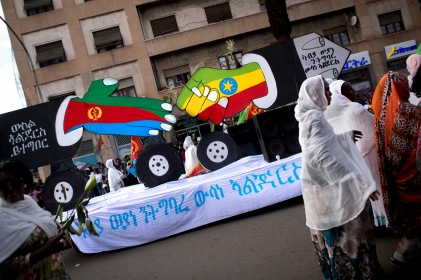Fittingly, a few days since I returned from a visit to Eritrea that coincided with the 28th celebration of Eritrean independence on 24th May, an academic article I wrote in November 2018 about the rapprochement between Eritrea and Ethiopia has just been published (and can be accessed here).
Its last section on the potential future urged caution, a caution that seems more and more justified when considering my experiences of the last two weeks in Eritrea. My first visit to the region since the rapprochement was to the Ethiopian side, to Mekelle, in October 2018, a time when the border was truly open and few checks were in place for those crossing. This was always to be an unusual and temporary arrangement, until such a time when more formal rules and regulations that would guide the crossings of goods and people between both countries would be in place.

copyright: http://www.iponphoto.com
Still, in the week running up to the actual celebrations, most people I spoke to were hopeful and excited. The border would be opened again soon after independence day, that was the wide expectation. And really, when the border was open without deterrent, Ethiopian business-people took full advantage, and Eritreans could not compete with them, so this unregulated flow of goods could not go on. At the same time, and whether Ethiopian businesses made undue profit or not, everybody had welcomed the sharp decreases in the price of many goods that followed the original border opening in September 2018 – prices have now crept up again, unsurprisingly, even if not to levels before the rapprochement.
But for now, the Ethiopian cars and lorries that clogged Eritrean streets have disappeared. On a trip to the Southern border one passes the remains of a big ‘Mekelle market’ on the outskirts of Asmara, were people used to fill their car bouts with Ethiopian products – now a few pickup trucks and the remains of some temporary stalls is all that is left. Still, many Eritrean business people wait rather excitedly for all the future opportunities a regulated open border will bring ‘very soon’, as a common phrase goes. A few days before the actual independence day, there is what is called the ‘carnival’, where different regions of the country present the country’s history through artistic representations.

copyright: http://www.iponphoto.com
Some parts of the narrative being presented are slightly puzzling: They show the steadfast and resilient Eritrean people, how they have been betrayed by Ethiopia (and other powers) throughout history, but always kept their outstretched hand in response to the Ethiopian fist. ‘They simply recycle their displays every year’ one Eritrean friend tells me, but still, the narrative of Eritrean resilience against all odds dominates also the accounts in the news and the only newspaper, the Eritrean Profile. No mention of the political changes in Ethiopia that ushered in the rapprochement, its new government making the first move in stretching its hand out for peace, and the motto of this year’s celebrations, Resilience for Higher Progress, perhaps says it all.
And then the day of the official celebration comes, and most of my Eritrean friends and acquaintances wait for the speech of the President in eager anticipation. When it comes, most are dejected: No mention was made of the peace process nor how future relationships with Ethiopia could unfold, only some vague reference to how Eritrea had to ‘overcome political subterfuges’. In the run up to the official event at Asmara stadium, there were rumours, even in PFDJ circles, that Dr Abiy would attend the celebrations – in the end he was not even mentioned by name nor was anything about the future relationship with Ethiopia on offer, or an indication about when the border might be re-opened. All that was said was a call for careful analysis of the unfolding reality – whatever that reality may be.
Eritreans are used to making the best out of every situation and adapt. Some are given hope by listening to Ethiopian radio and watching Ethiopian TV, from where more information about a future border opening is available – but the latter will of course only happen with Eritrean consent. Some of those who went to visit Ethiopia during what now is already being referred to as ‘the golden weeks of an open border’ but came back, are now sitting on packed suitcases quite literally. Having seen how easily any opening can be reversed , they will not make the same mistake again ‘thinking something will really change’.
Another acquaintance tells me that most arrangements on how to regulate cross-border issues are in place, just some minor issues need to be sorted. Well, if that is the case, I am sure most Eritreans would understand and support a wait. But why not tell them? Why not explain that the border might be closed for a little longer until certain issues are being resolved? That is the real cruelty of the situation, and a dynamic that has characterised Eritrea politics for almost 20 years now: the feeling of being left in limbo among ordinary Eritreans. ‘We give 100% to our country’ is how a friend describes it, ‘but they do not even talk to us’.
This blog first appeared on Tanja R. Müller’s blog

Trackbacks/Pingbacks